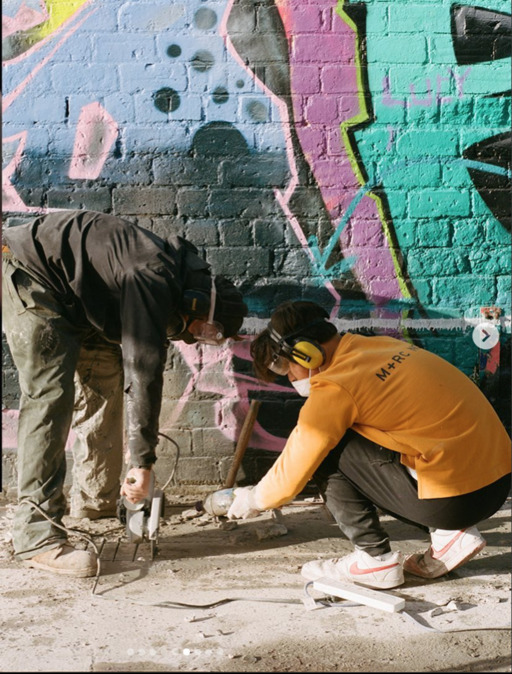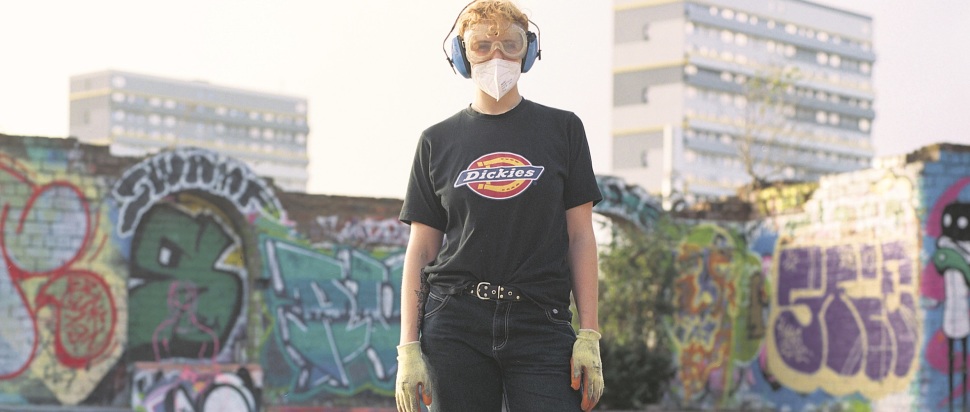Ramping Up: Scotland’s skateparks roll with the punches
Fences, bureaucracy, new-builds – your local skate park is under threat. We chat with Scotland's DIY skate parks about the struggle to find (and keep) skating space
Sitting in one of Leith’s only remaining skate spots, Dalmeny Park, I spend a Monday evening with Ruari, 34, a prevalent figure in Edinburgh’s DIY skatepark scene. Since his early teens, Ruari has been dedicated to building ledges, rails, and ramps and has played a major part in pretty much every community-driven DIY skateboarding project in Edinburgh over the last ten years. His latest DIY project in Leith, a wooden ramp constructed in an empty lot, has had to close its doors after its proximity to a recently built substation was flagged up by Scottish Power.
“It’s just the risk you take when you don't want to wait for all the planning and fundraising. There's a horrendous amount of bureaucracy and red tape to get through to get a facility built,” says Ruari. Spaces like Leith DIY have been appearing and disappearing for years now, built in somewhat of a legal grey area, where those involved in the construction do not necessarily have the right to build but local authorities struggle to justify their demolition (at least for a few years). Speaking of ‘Rat City’, a 2017 project that he and several others worked on down by Ocean Terminal, Ruari recollects how it existed in this awkward position of legality: “While one part of the council was funding us, another part of the council basically gave us a cease and desist, and then eventually tore it down.”
Scotland’s DIY skatepark scene has recently garnered national attention after Glasgow’s Kingston DIY, built by a group of friends during COVID, was closed to the public in June. Sitting under a section of the M8 flyover, the space has been fenced off by Transport Scotland, citing 'high volumes of anti-social behaviour, fire raising, vandalism, graffiti, [and] drug use.'
Tam, 27, joined the Kingston DIY project a few weeks after its first obstacles were set in concrete and helped transform an area once devoid of value into a thriving community hub. “There was just loads of needles, and it was just kind of grim, but then as soon as a couple of things were built there... it became a spot where kids would go down with their parents,” says Tam. “People from across the street would come down and build community planters... It became this really thriving community space that Kingston didn't really have before.”
The closure of Kingston has not only affected the local area’s community space, but it has also impacted the wider Scottish skating scene. In an attempt to salvage past work, parts of Edinburgh’s now dismantled Leith DIY ramp have migrated to Kingston, where they now lie fenced off. "The rest of it's all sitting in a yard here,” says Ruari. Speaking about the future of the Leith DIY project, Ruari expresses frustration: “I don't know what I can do at this point.” Without adequate space to relocate the Leith ramp, the hard work of the DIY’s volunteers will be wasted.

Arches DIY. Image: Angus Mackinnon.
Projects like these not only give purpose to undeveloped land, but they also generate outside interest in places where there previously was none. Back in March, the American skateboard company AntiHero released Turbo Island, a video which saw their professional team tour across the UK. Both Kingston DIY and Leith DIY received a visit from the AntiHero team. “Literally the best skater, the greatest of all time, Grant Taylor […] checking out our DIY spot and at the same time kids seeing skateboarding for the first time and having a go,” says Ruari. “It's inspiring in itself to me.”
Ethan, 22, a semi-pro skateboarder for Focus Scotland reflects this attitude towards getting kids involved in the sport. As Ethan notes, “It was very nice seeing kids learn a new skill and flourish within that new skill.” Ethan worked for Transgression indoor skatepark from 2020 up until its closure in 2023 as a coach for younger skaters.
As reported by the Edinburgh Evening News, as part of Ocean Terminal’s redevelopment plan to transform the admittedly vacant shopping centre into flats and amenities, Transgression – the capital’s only indoor skatepark – is set to become a bingo hall. “Replacing this safe, relaxed environment for kids from all around Edinburgh and the Lothians and replacing it with a bingo hall... it’s a travesty, for lack of a better word. It's really, really rubbish,” Ethan begrudges.
Although Edinburgh has seen two closures in the last year, and Glasgow is losing one of its immensely popular DIY spots, the public response to Kingston’s closure has been overwhelming, with over 4,000 people (at time of writing) signing a petition on Change.org to keep the space open. Tam is still hopeful for Scotland’s skating future: “I think things like this are a testament to the skate scene and the skate community in Scotland. Of course, it's terrible when the council threatens to shut down a spot, but it's really beautiful to see the reaction that it gets from the community and the general public.”
Responses such as this are encouraging for community projects across Scotland, and it seems that the DIY scene will keep trying whether or not local authorities deem the practice palatable. However, the decisions made by those in power will ultimately decide if the scene will sink or swim.
